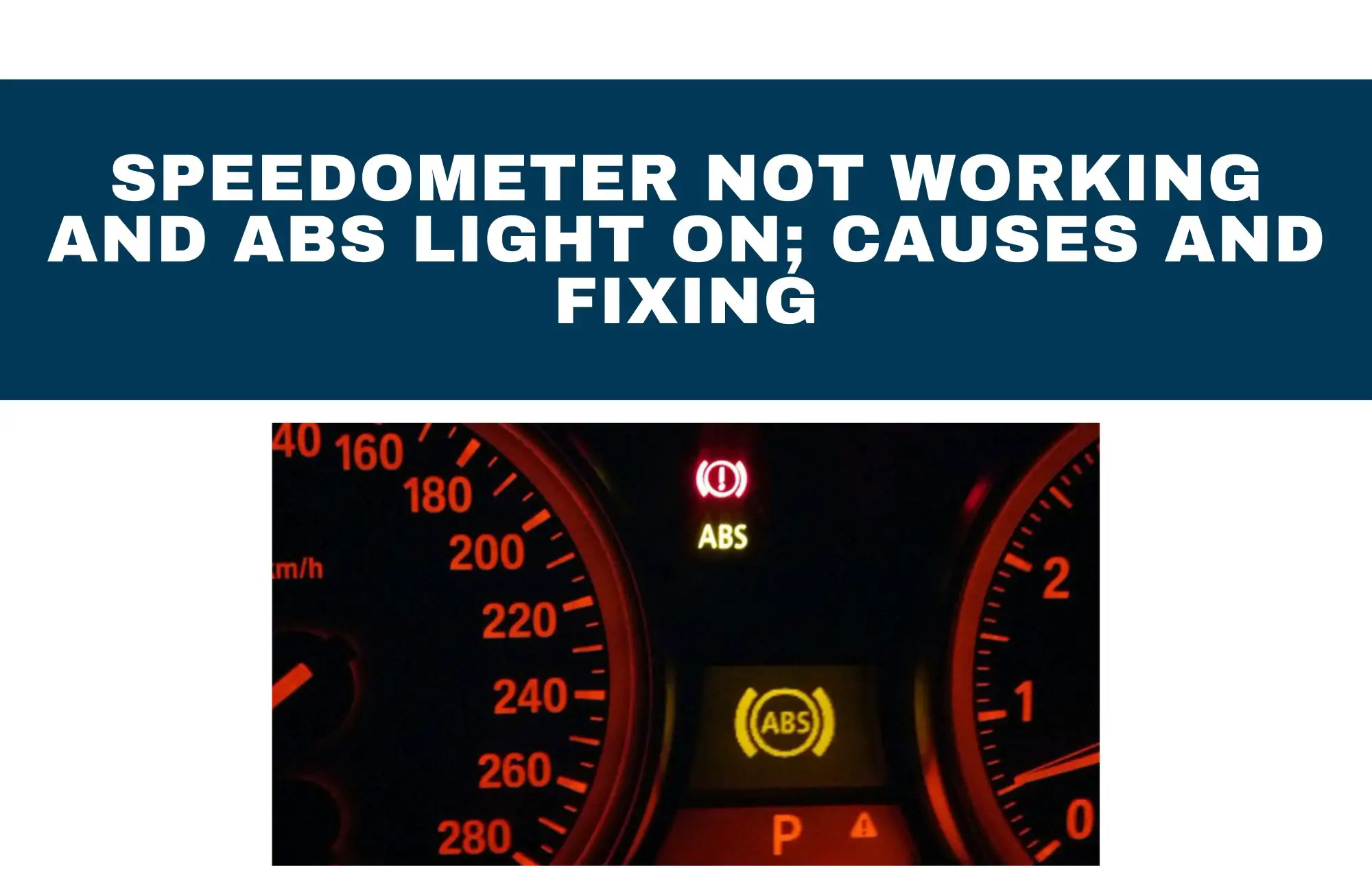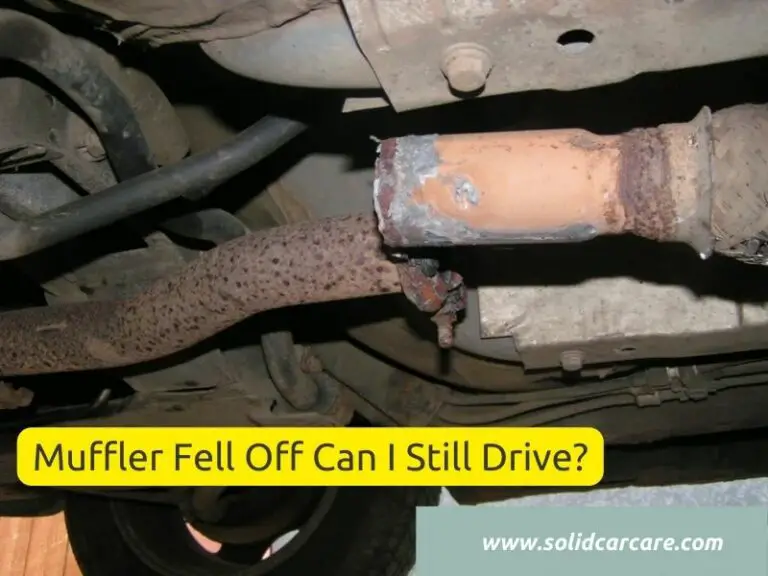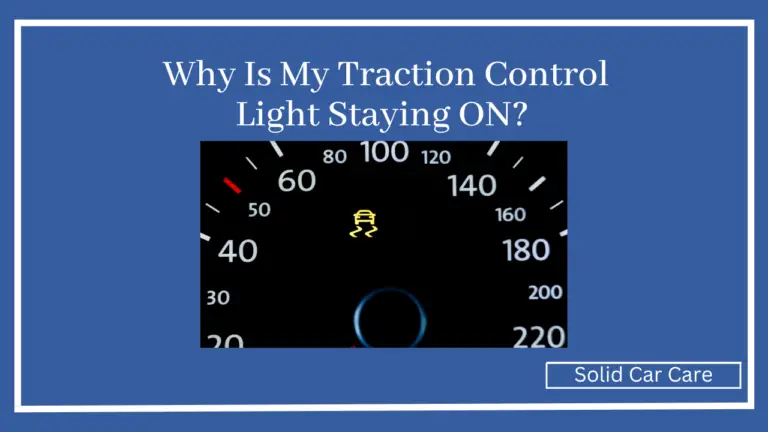Speedometer Not Working And ABS Light On; Causes And Fixing

Are you feeling like a modern-day Fred Flintstone, driving around with a non-functioning speedometer and an illuminated ABS light on your dashboard? Don’t worry, you’re not alone.
These warning signs can be frustrating, but they’re also indicators of potential underlying issues that need attention.
In this article, you’ll discover the common causes behind these problems, some of which you may be able to fix yourself, and others that might require the expertise of a qualified mechanic.
So, buckle up and get ready to uncover the mysteries behind your speedometer and ABS light woes.
Table of Contents
- Key Takeaways
- Common Causes for Speedometer and ABS Light Issues
- Potential Complex Causes for Speedometer and ABS Light Problems
- Steps to Take if Your Speedometer and ABS Light Are Not Working
- Conclusion
Key Takeaways
- A non-functioning speedometer and illuminated ABS light can indicate simple causes such as a blown fuse, faulty wheel speed sensor, or loose connections.
- More complex causes can include ABS module failure or speedometer malfunction.
- It is crucial to have your car diagnosed by a qualified mechanic to determine the exact cause and recommend the appropriate repair.
- Avoid driving if possible and consult your car’s manual for specific troubleshooting steps. Get multiple estimates if the repair is costly.
Common Causes for Speedometer and ABS Light Issues
Here are the common causes for speedometer and ABS light issues:
- A blown fuse: This can disable both the ABS system and the speedometer, so it’s important to check and replace the fuse if necessary.
- A faulty wheel speed sensor: This can disrupt the functionality of both the ABS system and the speedometer.
- A loose connection: Loose electrical connections can also cause problems with the speedometer and ABS system.
It is crucial to address these issues promptly to ensure the proper functioning of the speedometer and ABS system.
Blown fuse
If you’re experiencing a non-functioning speedometer and an illuminated ABS light on your dashboard, one possible cause could be a blown fuse. The ABS system and speedometer often share a common fuse in vehicles. To troubleshoot this issue, you can check your car’s fuse box manual to identify the relevant fuse and replace it if necessary.
However, it’s important to exercise safety precautions and consult a professional for a proper diagnosis. Attempting to fix electrical issues without the necessary expertise can lead to potential damages and safety hazards. A qualified mechanic can use diagnostic tools to pinpoint the exact cause and recommend the appropriate repair.
Faulty wheel speed sensor
A faulty wheel speed sensor is a common cause for speedometer and ABS light issues in vehicles. These sensors play a crucial role in the ABS system by providing data on the rotational speed of each wheel. When a wheel speed sensor malfunctions, it can disrupt the functionality of both the speedometer and the ABS system.
Some signs of a faulty wheel speed sensor include a non-functioning speedometer, an illuminated ABS light on the dashboard, and erratic or inaccurate readings. If you suspect a faulty wheel speed sensor, it’s recommended to consult a qualified mechanic for troubleshooting and potential replacement. Attempting a DIY repair on the wheel speed sensor isn’t recommended due to the technical nature of the task.
The wheel speed sensors are important components in the ABS system, as they help prevent wheel lock-up during braking and ensure the vehicle maintains stability and control.
Loose connection
One potential cause for speedometer and ABS light issues is a loose connection between the ABS system, speedometer, and wheel speed sensors. Loose connections can occur due to vibration or wear over time. When the connection becomes loose, it can disrupt the flow of electrical signals between these components, leading to malfunctioning speedometer readings and an illuminated ABS light on the dashboard.
To troubleshoot loose connections, visually inspect the electrical connectors for any signs of looseness or corrosion. If a loose connection is detected, it can be secured by tightening the connectors or using electrical tape to ensure a snug fit.
It’s important to address loose connections promptly as they can affect the accuracy of speedometer readings and the proper functioning of the ABS system. Regular maintenance and inspections can help prevent loose connections from occurring in the first place.
Potential Complex Causes for Speedometer and ABS Light Problems
Now, let’s delve into the potential complex causes for your speedometer and ABS light problems.
One possible culprit could be a failure in the ABS module, which serves as the control center for the anti-lock braking system.
Another complex cause could be a malfunction in the speedometer itself, either due to internal component failures or wiring issues.
These intricate issues may require the expertise of a qualified mechanic to diagnose and repair.
ABS module failure
The most complex potential cause for non-functioning speedometer and illuminated ABS light issues is a failure of the ABS module. This component, responsible for controlling the anti-lock braking system, can exhibit several symptoms when it starts to fail.
Troubleshooting ABS module issues may involve checking for signs such as erratic ABS operation, ABS pump running continuously, or ABS warning light staying on. If you suspect a failing ABS module, it’s essential to address the issue promptly.
ABS module replacement is typically necessary, and the cost of ABS module repair can vary depending on the vehicle make and model. To ensure your safety on the road, consult a qualified mechanic for an accurate diagnosis and proper repairs.
Speedometer malfunction
If you’re experiencing a non-functioning speedometer and an illuminated ABS light on your dashboard, a potential complex cause for these issues could be a malfunction in the speedometer itself.
The speedometer is responsible for displaying your vehicle’s speed, and when it malfunctions, it can lead to inaccurate readings or complete failure. Several factors can contribute to a speedometer malfunction, including speedometer calibration errors, a damaged or broken speedometer cable, or internal component failures.
Additionally, the speedometer needle jumping or displaying inconsistent readings can indicate a problem. When it comes to speedometer repair, the cost can vary depending on the specific issue and the make and model of your vehicle. It’s essential to have a qualified mechanic diagnose and repair the problem to ensure the accuracy and functionality of your speedometer.
Steps to Take if Your Speedometer and ABS Light Are Not Working
Experiencing a non-functioning speedometer and an illuminated ABS light can be indicative of several underlying issues, requiring you to take certain steps for resolution.
Here are some troubleshooting tips to help you address the problem:
- Check the fuse: A blown fuse can disable both the ABS system and speedometer. Refer to your car’s fuse box manual to identify the relevant fuse and replace it if necessary.
- Inspect the wheel speed sensor: Malfunctioning wheel speed sensors can disrupt both the ABS system and speedometer functionality. Inspect these sensors for any signs of damage or wear and replace them if needed.
- Secure electrical connections: Loose connections between the ABS system, speedometer, and wheel speed sensors can cause issues. Check for any loose connections and resecure them if necessary.
However, if these steps don’t resolve the issue, it’s crucial to consult a qualified mechanic. They can use diagnostic tools to pinpoint the exact cause and recommend the appropriate repair.
Additionally, avoid driving if possible as a non-functioning speedometer can jeopardize driving safety. Consult your car’s manual for specific troubleshooting steps and consider getting multiple estimates before committing to any costly repairs.
Conclusion
In conclusion, when you experience a non-functioning speedometer and an illuminated ABS light on your dashboard, it’s important to address the issue promptly for your safety on the road.
Simple causes such as blown fuses or faulty sensors can be fixed with some guidance, but more complex causes may require the expertise of a qualified mechanic.
Seek professional help and have your car diagnosed to ensure a properly functioning speedometer and ABS system.






